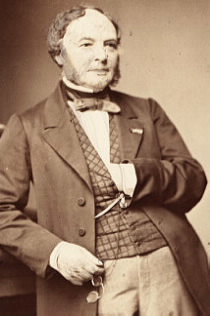Louis Hachette
Louis Christophe François Hachette (born May 5, 1800 in Rethel , Ardennes department , † July 31, 1864 in Paris ) was a French bookseller and publisher .
life and work
Hachette studied education at the École normal supérieure . Politically interested and engaged ( restoration ), he moved in 1822 to the Sorbonne to law study. In 1826 he broke off his studies and founded a bookstore with an affiliated publishing house in Paris . His aim was to lay the foundations to improve school teaching and to educate the “common people” through manuals and textbooks, educational journals, dictionaries, etc. Ä. To increase. Later, arrangements of French, Greek and Latin classics followed, which were also widely distributed thanks to their low price.
When the Second French Republic was proclaimed in 1848 , there were also changes in business. That is why Hachette and business friends founded a discount bank, the “Comptoir national d'escompte de Paris” (from 1966 part of BNP Paribas ).
From 1850, Hachette and his sons-in-law Louis Bréton († 1883) and Émile Templier († 1891), and later with his sons (H. & Compagnie), began to publish fiction and illustrated series in his publishing house; u. a.
- Bibliothèque variée
- Bibliothèque des meilleurs romans étrangers
- Bibliothèque popular
- Bibliothèque rose illustrée
- Bibliothèque des merveilles
- Collections des guides et itinéraires (by Adolphe Joanne and others)
In 1855 Hachette founded the magazine Le journal pour tous and a little later the Tour du monde . As a businessman he was a member of the Comptoir d'escompte of Paris and campaigned for the protection of literary and artistic property ( copyright ) in numerous articles and reports .
literature
- A. Lesieur: Notice sur la vie de M. Louis Christophe François Hachette . Lahure, Paris 1864.
- Jean-Yves Mollier: Louis Hachette (1800-1864). Le fondateur d'un empire . Fayard, Paris 1999, ISBN 2-213-60279-4 .
| personal data | |
|---|---|
| SURNAME | Hachette, Louis |
| ALTERNATIVE NAMES | Hachette, Louis Christophe François |
| BRIEF DESCRIPTION | French publisher, bookseller and author |
| DATE OF BIRTH | May 5, 1800 |
| PLACE OF BIRTH | Rethel |
| DATE OF DEATH | July 31, 1864 |
| Place of death | Paris |
